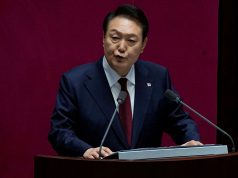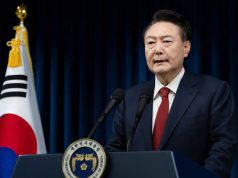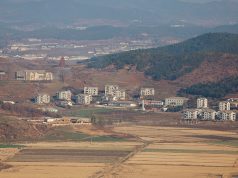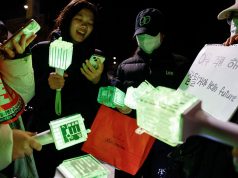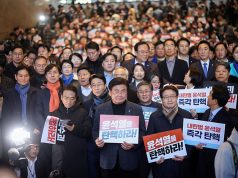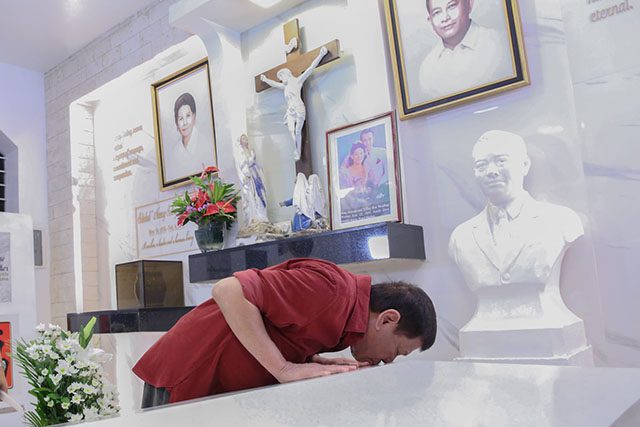
The legacy of Soledad Duterte as an activist was remembered after her son visited her resting place in Davao City on Sunday.
Before flying back to Manila from his hometown, President Rodrigo Duterte paid his respects to his parents who were laid to rest at the Roman Catholic Cemetery, a practice he has been doing since he was still a mayor.
Duterte’s parents are Vicente Duterte, former governor of the then-undivided Davao Province and Soledad, one of the province’s respected civic leaders who fought against the Marcos regime.
The Presidential Communications Operations Office released photos of the visit on social media on Monday.
These eventually circulated after some news outlets reported the president’s activity as well.
Some Filipinos then remembered his mother’s legacy as “Davao’s foremost ‘Yellow’ activist” in contrast to how some activists have been treated in the current administration.
“Imagine no, the son became the monster that her mother passionately fought against,” lawyer Emil Marañon tweeted in response to the pictures.
“Ahh he visited his mother who was once an activist pero he red-tags and imprisons activists from this time? How fascinating,” another Twitter user said.
“You’re a great disgrace to your mother lol,” wrote a different Filipino.
“But didn’t his mother fought against corruption and tyranny? The apple fell very far from the tree,” another online user said.
The Human Rights Watch‘s 2021 world report revealed that different activists continue to be threatened, attacked and killed in the Philippines under the current administration. An excerpt of it reads:
On June 4, OHCHR published a report that found ‘numerous systematic human rights violations’ in the Philippines, among them the killing of 208 human rights defenders and activists since 2015.
Leftist activists and human rights defenders were key targets of physical and online attacks. On August 17, unidentified gunmen shot dead Zara Alvarez, a legal worker for the human rights group Karapatan, in Bacolod City in the central Philippines.
Alvarez’s killing came a week after peasant leader Randall Echanis was found dead, apparently tortured, in his home in Quezon City. Alvarez was the 13th Karapatan member killed during the Duterte administration.
The attacks against activists occurred in the context of the government’s campaign against the communist New People’s Army insurgency.
Government and military officials have accused Karapatan and the other groups in its network of being supporters of the insurgents in a ‘red-tagging’ campaign that puts them at heightened risk of attack.
The military, national security agencies, and the police have actively used social media to convey threats that have resulted in tens of red-tagged people being killed in the past year.
Last year, the chief executive signed the Anti-Terrorist Act of 2020 which law experts and activists fear would potentially stifle dissent and curtail constitutionally-protected civil liberties with its controversial provisions.
Earlier this month, there were renewed calls to “junk” the law after the Supreme Court held oral arguments for the 37 petitions challenging its provisions.
Davao’s moving force against Marcos
Soledad died at the age of 95 in 2012. She was known to be at the “forefront of the Yellow Friday Movement of Davao, which helped fan the February EDSA Revolution that pushed former president Cory Aquino to power.”
The Yellow Friday Movement was a Mindanao-grown initiative that opposed the Marcos administration in the 1970s to ’80s.
Known to many as “Nanay Soling,” Soledad was remembered as the moving force during the early years of women’s organizing in the province which dated back to the Martial Law years.
Former Gabriela party-list representative Luz Ilagan said that Soledad was “already a woman activist long before the term was coined.”
“She showed us through example how to be committed and be strong in the face of adversities,” she said to Inquirer.
“Davao was heavily militarized, we had no resources, we had our own families to raise, we were still learning the ropes in alliance work; and there she was, a teacher, a fund-raiser, an organizer, an inspirational model and a friend, not to mention, ‘inahan sa kanunay nga panabang (mother of perpetual help),” Ilagan added, recalling the days when the country was under Marcos.
In recognition of Soledad’s role in the anti-dictatorship movement, Aquino asked her to become an officer-in-charge vice mayor of Davao City.
However, Soledad, who was 70 then, suggested that the role should be given to her son, Rodrigo, instead.





